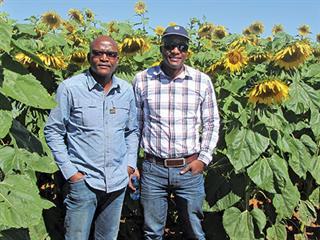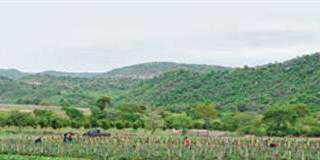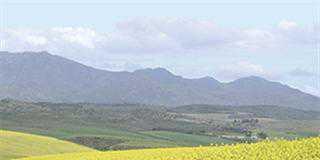
Morapedi Mutloane grew up in the Lichtenburg area in the North West and has been interested in farming since his school days. “My grandparents farmed extensively and I grew up in that environment. But I decided to study a BA (Hons) in Industrial Psychology at Wits,” he says.
This led to a career in the corporate world. Now, however, Morapedi has returned to farming. “It’s not a fashionable business, but farming has great potential,” he says. “I knew beforehand that personal sacrifice, especially in the early years, was a given. I went through a steep learning curve, searched for high-potential land, had challenging negotiations, bought tractors and equipment and recruited workers to help build this operation.”
READ MORE: From a driver to successful small-scale pig farmer
Asked if he has any regrets, Morapedi pauses for a moment, then shakes his head. No, he says, it was time anyway to move on and seek out the kind of personal challenges he could no longer find in the corporate world. One of these presented itself immediately: finance. “I knew financiers wouldn’t take a novice seriously and had to raise capital to get things off the ground,” he recalls.
Making the leap
In early 2011, while still engaged in farming part-time, Morapedi’s focus was on cattle. He bought 20 stud Beefmaster heifers and a bull. In January 2012, he leased 350ha of good farmland in Lichtenburg, which he soon expanded to 1 000ha. That same year, he bought 120 commercial Brahman and Beefmaster females and four bulls. In April 2012, his business model evolved to include crop production, initially maize for feed in a small cattle feedlot.
Morapedi established the feedlot on 300ha of leased private land, sold 80% of his breeding stock and bought approximately 25 weaners per month. The feedlot is now well established and has produced about 25 grain-fed slaughter cattle monthly since October 2012.
READ MORE: From fruit hawker to successful farmer
“At the end of 2012, I left my job and started farming full time,” says Morapedi. He currently employs 10 full-time and more than 50 seasonal workers. Approximately 600ha of his farm is under rainfed sunflower; the balance is under Monsanto BT white maize. His aim is to maximise his profit in maize farming, he explains, and BT maize reduces the need for insecticides and therefore input costs.
Morapedi expects a maize yield of 4t/ha and a sunflower yield of 1,5t/ ha. He rotates maize with sunflower and plans to introduce soya beans into the mix. Wise fertiliser use and other appropriate agronomic practices significantly increase Morapedi’s agricultural productivity and farm income. For optimum production, he applies fertiliser at 200kg/ ha at planting, with 100kg/ ha topdressing when the maize is knee-high six weeks later.
He has also found himself a ready market after registering to supply maize to the World Food Programme (WFP). “Every cent I make, I put back into the business,” he explains. “This keeps it growing.” Morapedi is realistic about the capital investment needed to grow a farming enterprise.
“I soon realised that my initial capital was a fraction of what was needed to farm,” he admits. “Fortunately I have good partners in Standard Bank and Omnia who provided me with input finance, technical support and facilitated access to markets.”
The future
Morapedi has clear plans for the future, and intends expanding to 3 000ha, and produce white maize, sunflower, dry beans and possibly groundnuts, and sorghum for niche markets. Cattle remain important for his cash flow, and he aims for a herd of at least 1 000 head. He would also like to acquire his own farm. And he’s not afraid to dream big, hoping to move one day into processing, trading and grain storage.
His ultimate goal is to expand to other provinces, move up the value chain, increase profit and establish agribusinesses specialising in training, consulting and agri-transformation. “Going into the lands, being outside and seeing things grow is more refreshing than sitting in an office,” he says. Morapedi has proved that although agriculture can be a tough career, one can still be successful.
“I’m delighted to have proved my critics wrong,” he says.
Phone Morapedi Mutloane on 083 458 5722.













